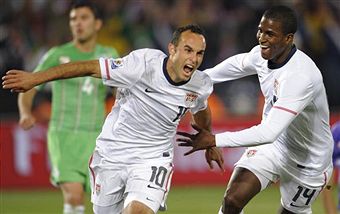By Mike Rowbottom
July 21 – A report from a leading sports economist warning that bidding for another World Cup would be a costly mistake for the United States has generated fierce debate.
Dr Dennis Coates, who teaches economics at University of Maryland, has questioned the benefit of hosting the event in a newly released paper entitled “World Cup Economics: What Americans Need To Know About a US World Cup bid”, which claims that the 1994 World Cup finals had cost the average US hosting city $712 million (£469 million).
According to Coates, the paper is an attempt to challenge “the rosy assumptions being made by US bid leaders, and I hope it will force proponents to be more forthcoming with answers about what we can really expect from a US World Cup.”
Coates maintains that, despite organisers claims, hosting the World Cup in 2018 or 2022 would not benefit the American economy.
“It won’t be a boon for the American economy; in fact, it will likely cost the United States billions of dollars in lost economic impact,” he writes.
“For example, economic estimates in support of the 1994 US World Cup were later shown by economists to have been off by up to $14 billion (£9 billion).
“Far from having a positive economic impact, the last World Cup we hosted, a so-called major success, had a negative impact on the average US host city of $712 million (£469 million).
“Yet no one is discussing these figures despite the current economic troubles we face.…Few analysts who aren’t in the employ of the event boosters have ever found such events to pay for themselves in a purely dollars and cents view.”
Coates adds that the recent World Cup in South Africa suffered from a gap between optimistic projected costs and actual costs.
“The proposed budget for the 2010 games was about $225 million (£148 million) for stadiums and $421 million (£277 million) overall.
“Expenses have far exceeded those numbers.
“Reported stadium expenses jumped from the planned level of $225 million (£148 million) to $2.13 billion (£1.4 billion), and overall expenses jumped similarly from $421 million (£277 million) to over $5 billion (£3 billion).”
Contact the writer of this story at zib.l1744408242labto1744408242ofdlr1744408242owedi1744408242sni@m1744408242ottob1744408242wor.e1744408242kim1744408242
Related stories
July 2010: US will make decision about 2018 World Cup at “right time” claims Gulati
June 2010: Fox Soccer Channel becomes partner of USA World Cup bid
June 2010: Clinton admits US unpopularity abroad could damage World Cup bid
June 2010:Clinton gives US World Cup campaign big boost
June 2010: Freeman joins USA World Cup bid

